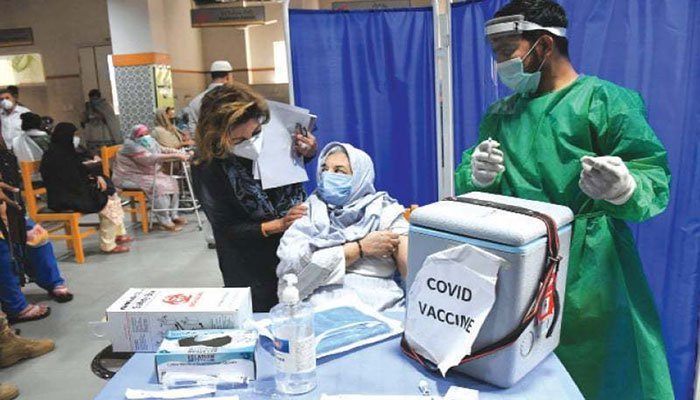The Sindh Health Department has stated that it will begin inoculating individuals without a computerized national identification card in order to urge more people to be vaccinated against the new coronavirus (CNIC).
Those who do not have a CNIC will be required to produce their B-forms or educational papers in order to get vaccinated, according to the Sindh Health Department.
Sindh’s Chief Minister Murad Ali Shah stated on July 30 that the government will give COVID-19 jabs to people who do not have a CNIC, adding that procedures for the purpose were being reviewed.
According to reports, more than 2,000 people in Karachi have already received the COVID-19 vaccination without needing to produce their CNICs, citing the Sindh health department.
Because the government is required to gather data on all vaccinated people, those without a CNIC were required to have their biometrics taken at vaccination centers and their mobile phone numbers registered to complete the procedure.
Pakistan reported 67 additional COVID-19 fatalities on Tuesday, bringing the total to 23,529 throughout the country. According to National Command and Operation Centre’s (NCOC), 3,582 new coronavirus cases have been reported in the past 24 hours.
With 75,373 active cases throughout the nation, Pakistan’s coronavirus positivity rate was 7.19 percent.
According to NCOC statistics, at least 49,798 coronavirus tests were performed across the country in the past 24 hours, with 3,582 of them returning positive.
Meanwhile, 682,290 individuals in the country have recovered from the virus thus far.
Furthermore, in the past 24 hours, 1,355 people have recovered from the virus, bringing the overall number of recoveries to 944,375, while the total number of cases has risen to 1,043,277.
The overall number of coronavirus patients in Sindh is 387,261, 145,306 in Khyber Pakhtunkhwa, 358,387 in Punjab, 88,344 in Islamabad, 30,627 in Balochistan, 25,034 in Azad Jammu and Kashmir, and 8,318 in Gilgit-Baltistan, according to a province-by-province breakdown.
Asad Umar, Pakistan’s Federal Minister for Planning, Development, and Special Initiatives has announced to impose additional restrictions in major cities on Monday, citing the country’s increasing number of COVID-19 infections.
The minister stated in a news briefing in Islamabad alongside Special Assistant to the Prime Minister on Health Dr. Faisal Sultan that all decisions were taken after Prime Minister Imran Khan’s approval.
The new COVID-19 restrictions, according to the ministry, will take effect on August 3 and will last until August 31.
In Punjab, additional restrictions will be implemented in Rawalpindi, Lahore, Faisalabad, and Multan; in Khyber Pakhtunkhwa, further limits will be enforced in Peshawar and Abbottabad.
Restrictions will be enforced in Muzaffarabad and Mirpur in Azad Jammu and Kashmir, while Gilgit and Skardu will be subjected to the new regulations.
Lockdowns are already in place in Karachi and Hyderabad, but the NCOC’s additional restrictions will be effective from August 8, according to the minister.
“Sindh will decide the new course of action regarding restrictions in the province after August 8. If Sindh decides to relax its restrictions after August 8, then the new curbs announced by the NCOC today will come into effect,” he said.
All commercial operations will be stopped by 8 p.m. instead of 10 p.m., and indoor eating will remain prohibited. He said that outside eating will be permitted until 10 p.m. instead of 12 a.m. and that restaurants will be able to provide takeout and home delivery services 24 hours a day.
To prevent crowding inside cars, the minister stated that public transportation will run at half capacity.
He stated that shops and marketplaces will be closed twice a week, with regional administrations deciding on the safe days.
Umar further said that offices will continue to function at half capacity and urged the public to be vaccinated as soon as possible.
As Pakistan is gripped by the fourth wave, Prime Minister Imran Khan holds a meeting on COVID-19.
Prime Minister Imran Khan called a meeting on coronavirus earlier in the day as the pandemic spirals out of control, with over 8% positivity ratio recorded in the past two days.
Despite repeated warnings from health officials for the execution of government-mandated safety procedures, the COVID-19 situation in the nation deteriorated after Eid.
The group addressed the recent spike in COVID-19 positive cases and debated on how to stop the Delta form of the virus from spreading across the country.
The Prime Minister was informed of the Sindh lockdown, which has been in place since July 31 (Saturday) due to a significant increase in illnesses. The federal ministers have expressed significant opposition to the limitations in the province, claiming that they will jeopardize the province’s economic success so far.
Read more: https://pakobserver.net/pakistan/










